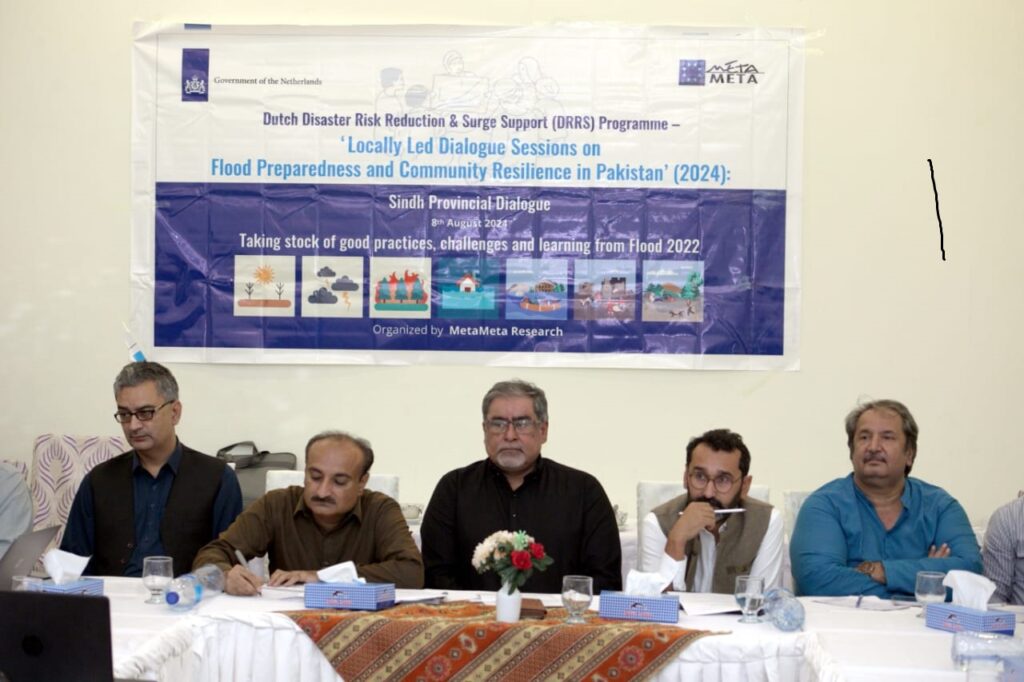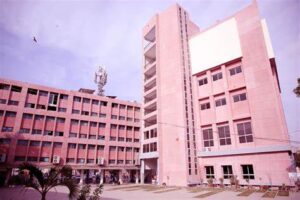Experts discuss preparedness to flood and resilience building in Sindh

Experts discuss preparedness to flood and resilience building in Sindh
By Ashfaque Soomro
Experts, practitioners and community leaders, in a consultative dialogue on preparedness and resilience building to floods in Sindh, province, have emphasized anticipatory actions and preparedness helps communities respond more effectively to potential disasters, minimizing their impact and supporting faster recovery. Officials, experts and community leaders opined that resilient water management is a cornerstone of both ecological health and resilience to floods. Rehabilitation of water bodies, not only restore vital ecosystems but also enhance the sustainability of housing and infrastructure, experts revealed.
Well-managed water systems contribute to improved soil quality, flood mitigation, and overall environmental stability, which are Sindh’s critical challenges amid climate change. Participants discoursed that it is crucial to harmonize infrastructure development, flood structural improvements with nature-based solutions. DG/PC Water Sector and Barrage Improvement Program, Government of Sindh said in his remarks on the occasion that investing in the restoration of wetlands, rivers, and lakes can lead to more resilient communities and infrastructure that better withstand climate impacts. The dialogue also revealed that timely dissemination and interpretation of early warning messages is essential to make at risk people prepared to flood.
The dialogue was facilitated by MetaMeta Research Netherlands under the auspices of Dutch Disaster Risk Reduction and Surge Support Program, which is aimed to build a comprehensive understanding of the challenges and lessons learned from the flood 2022 in Pakistan. The first provincial dialogue was organized in Hyderabad on 8th August 2024, which was attended by representatives of various government departments, civil society, donor organizations, academia, community leaders and media. The dialogue was moderated by senior development professional Mr. Ashfaque Soomro.
One of the major causes to flooding in Sindh is the encroachments and constructions on old water ways, which doesn’t allow flood water to discharge naturally taking its path. Losses can be avoided, if natural old water ways are rehabilitated, participants demanded. Remodeling of LBOD was also demanded by the participants.
Renowned international water expert and technical Director at MetaMeta Research Netherlands Dr. Fran van Steenbergen in opening remarks highlighted crucial points for improving flood risk management and resilience building. He said that the learning of community leaders, local experts and practitioners is highly valuable for developing more robust flood risk management strategies in Sindh. He said that building back better is the need of time, which we all must ensure in our programs and projects. He said that it is good to truly reflect on our learning of previous experiences. What went well, what didn’t work and what can be improved, can fine tune our preparedness planning and resilience building process to safeguard communities and secure development investment in Sindh.
Discussing the good practices, the forum was of unanimous opinion that the PDMA well-coordinated response to flood 2022, which also avoided duplication issues. However, conditions of road infrastructure to reach out poor of the poorest in spontaneous camps was a major challenge for the humanitarian actors.
Mr. Ajay Kumar, Assistant Director PDMA Sindh shared that providing relief items to villages, camps in affected areas was a critical challenge, as the roads were damaged in floods and it was highly difficult to bring aid to the people in affected areas, which took some time, but PDMA through district authorities reached out majority of the affected areas, despite these challenges. But based on that learning this year in 2024, following the advisories of Pak Met Department, the PDMA was well prepared and it mobilized relief articles, mainly the tents, dewatering pumps to DDMAs well in time, with the commitment to address any unforeseen situation. It is which is one of our good practices, based on our learning from flood 2022, he shared. Needed relief items are also prepositioned in PDMA’s warehouses, as a matter of preparedness, he further added.
Renowned civil society activist Prof. Mushtaque Mirani, in his remarks said that there is need to restore old water ways and translate resettlement plans into actions, to avoid losses and flood induced migrations in Sindh. Mr. Sarwan Baloch from WHH discussed that local government department is present at the union council level, and utilizing these structures to oversee and implement resilience-building measures can enhance accountability and ensure that community infrastructure projects are aligned to risk planning. Prof. Munir Mangrio from SAU Tando Jam said that generally the land in Sindh is flat, slop to divert flood water and inject to recharge ground water can be the two best options, which should be part of longer-term resilience building programs and policies.
Environmental writer Prof. Nawaz Kumbhar, Dr. Ali Akbar Hingorjo, Development professional Ms Farzana from IRC, NGO leaders Mr. Niaz Sial, Mr. Shahzado Malik, Ms Rukhsana Jarwar, Mr. Abbas Khoso, Mr. Khalid Babar, Ali Ashgar Lakho from Labor department, Nawaz Ali from Roads Department, Dr. Aijaz Kumbhar from Livestock Department, Mr. Najam Jamali from PBM Govt of Pakistan, Dr. Gulzar from LUMHS, Mr. Parvez Bhanbhan from SIDA and others discussed what critical flood risk management challenges and they recommended measures to avert risks to public and private infrastructure, human lives and livelihood resources.


